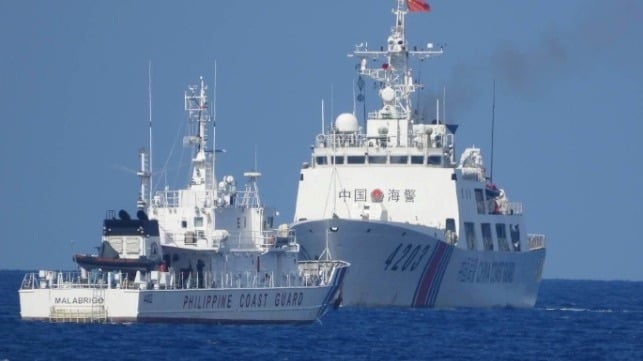China Attempts to Suppress Documentary on South China Sea

China's embassy in New Zealand attempted to suppress a public screening of a documentary about Philippine fishermen, according to producers of a film festival in Auckland.
China's government believes that it has sovereignty over the vast majority of the South China Sea under its "nine dash line" policy, named for the shape of a map created in the 1940s by the predecessor Nationalist Chinese government (Kuomintang). This rough outline covers all of the areas beyond national jurisdiction in the SCS, along with large portions of neighboring states' exclusive economic zones. China's claim to the western Philippine EEZ is the most contentious element of the "nine dash line," and Chinese and Philippine forces routinely clash near contested islands and reefs.
The documentary in question - "Food Delivery: Fresh From the West Philippine Seas" - follows a group of Philippine fishermen and the Philippine Coast Guard's efforts to resupply them at sea, despite obstacles created by the China Coast Guard.
The film was initially set to debut in the Philippines at a festival sponsored by grocery chain Puregold, but was withdrawn due to "external forces," the director claimed. Instead, it was rescheduled for a premier in Auckland at the DocEdge Festival, which billed it as a "banned film that must be seen." The Chinese embassy disagreed, and on July 4, it sent a letter to DocEdge in an attempt to prevent future showings.
In the letter, the embassy reiterated China's historically-based claims to the South China Sea, and it disparaged the 2016 arbitral ruling that found that China's claims in the Western Philippine Sea have no basis in international law. It accused the film's creators of disregarding "history and facts" in order to "amplify the Philippines' wrong position on the issue," and suggested that the documentary was a propaganda tool of the Philippine government - merely "one of its instruments of distortion."
In a brief response, DocEdge encouraged members of the public to see the film and reach their own conclusions, and said that it would stand by "the festival's independence and curatorial freedom." It also published the letter in full on its website.
The Philippine government pushed back on the Chinese attempt to suppress the film.
"The use of diplomatic pressure to demand the cancellation of the screening of the said documentary represent a blatant attempt to silence a powerful narrative that exposes the truth about the situation in the West Philippine Sea," said Philippine National Security Adviser Eduardo M. Ano in a statement Tuesday. "This interference is not only unacceptable, it is a direct affront to the principles of free expression, artistic freedom, and democratic discourse."
